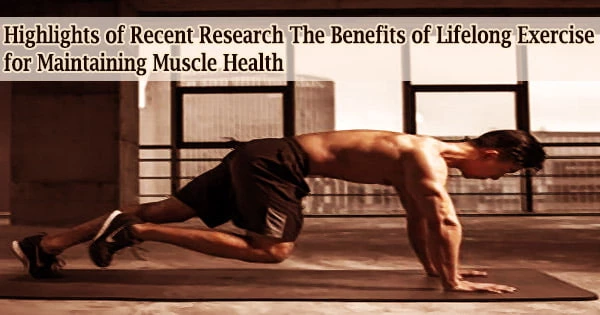According to research that was published in The Journal of Physiology, lifelong physical activity may be able to prevent age-related loss of muscle mass and function. In comparison to inactive people of all ages, those 68 and older who were physically active throughout their lives have the muscle that ages healthier performs better and is more fatigue-resistant.
This research is the first to examine human muscle, stem cell, and nerve activity. Researchers from the University of Copenhagen in Denmark discovered that older people who maintain physical activity throughout their adult lives whether, through resistance training, ball or racket sports, swimming, cycling, running, or rowing have more satellite cells, or muscle stem cells, in their muscles.
These cells guard against nerve deterioration and are crucial for long-term growth and muscle repair.
There were 46 male participants in the study. Young sedentary (15), elderly lifetime exercise (16), and elderly sedentary (15) were the three groups into which they were split. To test the effectiveness of their muscles, they engaged in a strenuous resistance exercise while seated in a mechanical chair.
It was measured how much force was generated. Blood samples were collected, and muscle biopsies from both legs were examined. The researchers discovered that older persons who had always exercised outperformed both older adults and younger sedentary adults.
Everyone is aware that they should work out and eat well. But doing that has benefits that go beyond keeping your appearance youthful as you age. Physical exercise may support the preservation of your cognitive capacities as you age, according to recent research from the University of Georgia. Additionally, not all exercise needs to be strenuous to have an effect.
The single most important message from this study is that even a little exercise seems to go a long way when it comes to protecting against the age-related decline in muscle function. This is an encouraging finding which can hopefully spur more people to engage in an activity that they enjoy. We still have much to learn about the mechanisms and interactions between nerves and muscles and how these change as we age. Our research takes us one step closer.
Casper Soendenbroe
Lead author, Casper Soendenbroe, University of Copenhagen, Denmark said:
“This is the first study in humans to find that lifelong exercise at a recreational level could delay some detrimental effects of ageing. Using muscle tissue biopsies, we’ve found positive effects of exercise on the general ageing population. This has been missing from the literature as previous studies have mostly focused on master athletes, which is a minority group. Our study is more representative of the general population aged 60 and above, as the average person is more likely to take part in a mixture of activities at a moderate level.”
“That’s why we wanted to explore the relation between satellite cell content and muscle health in recreationally active individuals. We can now use this as a biomarker to further investigate the link between exercise, ageing, and muscle health.”
“The single most important message from this study is that even a little exercise seems to go a long way when it comes to protecting against the age-related decline in muscle function. This is an encouraging finding which can hopefully spur more people to engage in an activity that they enjoy. We still have much to learn about the mechanisms and interactions between nerves and muscles and how these change as we age. Our research takes us one step closer.”
There are several different networks in the brain. These networks are constantly communicating with one another and exchanging information.
However, different brain regions are active at certain times. When someone starts attempting to perform a task, for instance, the network that is active when the body is at rest turns off. Another network begins operating at that point. It is important to note that the study only included male participants and that their average age was 73.
Follow-up research is required to determine whether the advantages of lifelong exercise are sustained later in life because the effects of ageing on muscular health become more obvious at 80 years and older. Further research on leisure time activities and female muscular health is required.
















